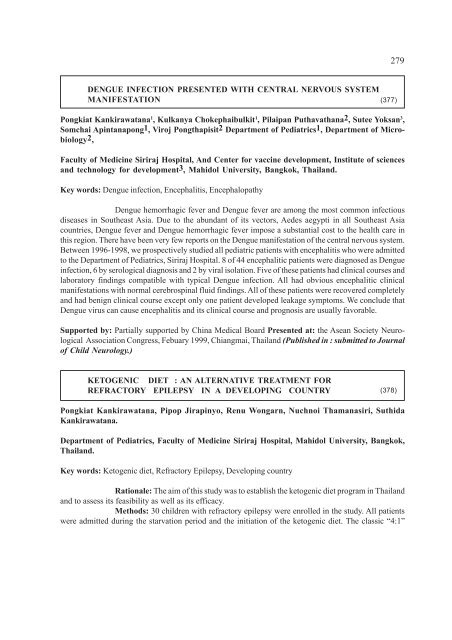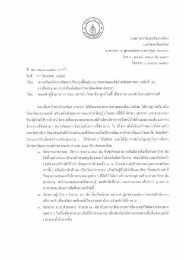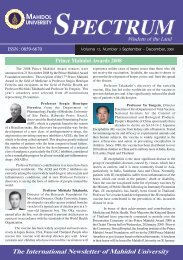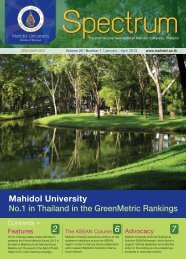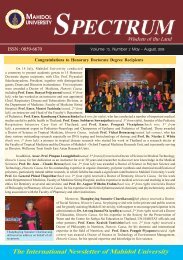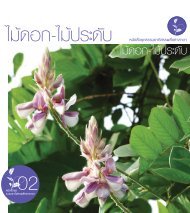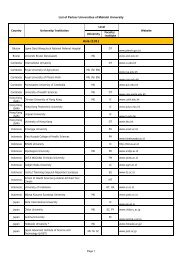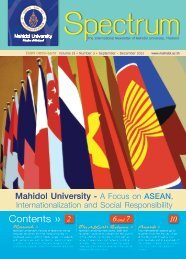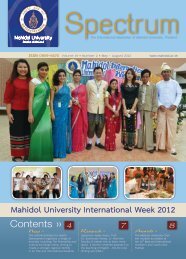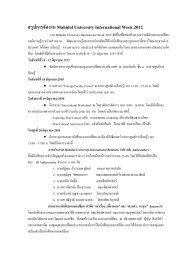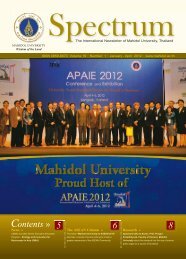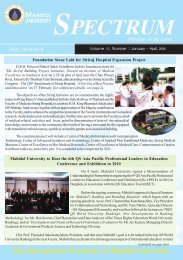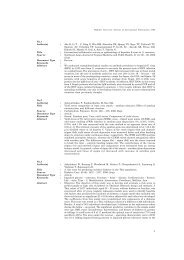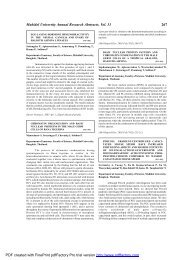THE OSTIA VENAE HEPATICAE AND THE RETHROHEPATIC ...
THE OSTIA VENAE HEPATICAE AND THE RETHROHEPATIC ...
THE OSTIA VENAE HEPATICAE AND THE RETHROHEPATIC ...
Create successful ePaper yourself
Turn your PDF publications into a flip-book with our unique Google optimized e-Paper software.
DENGUE INFECTION PRESENTED WITH CENTRAL NERVOUS SYSTEM<br />
MANIFESTATION<br />
(377)<br />
Pongkiat Kankirawatana 1 , Kulkanya Chokephaibulkit 1 , Pilaipan Puthavathana2, Sutee Yoksan 3 ,<br />
Somchai Apintanapong1, Viroj Pongthapisit2 Department of Pediatrics1, Department of Microbiology2,<br />
Faculty of Medicine Siriraj Hospital, And Center for vaccine development, Institute of sciences<br />
and technology for development3, Mahidol University, Bangkok, Thailand.<br />
Key words: Dengue infection, Encephalitis, Encephalopathy<br />
Dengue hemorrhagic fever and Dengue fever are among the most common infectious<br />
diseases in Southeast Asia. Due to the abundant of its vectors, Aedes aegypti in all Southeast Asia<br />
countries, Dengue fever and Dengue hemorrhagic fever impose a substantial cost to the health care in<br />
this region. There have been very few reports on the Dengue manifestation of the central nervous system.<br />
Between 1996-1998, we prospectively studied all pediatric patients with encephalitis who were admitted<br />
to the Department of Pediatrics, Siriraj Hospital. 8 of 44 encephalitic patients were diagnosed as Dengue<br />
infection, 6 by serological diagnosis and 2 by viral isolation. Five of these patients had clinical courses and<br />
laboratory findings compatible with typical Dengue infection. All had obvious encephalitic clinical<br />
manifestations with normal cerebrospinal fluid findings. All of these patients were recovered completely<br />
and had benign clinical course except only one patient developed leakage symptoms. We conclude that<br />
Dengue virus can cause encephalitis and its clinical course and prognosis are usually favorable.<br />
Supported by: Partially supported by China Medical Board Presented at: the Asean Society Neurological<br />
Association Congress, Febuary 1999, Chiangmai, Thailand (Published in : submitted to Journal<br />
of Child Neurology.)<br />
KETOGENIC DIET : AN ALTERNATIVE TREATMENT FOR<br />
REFRACTORY EPILEPSY IN A DEVELOPING COUNTRY<br />
Pongkiat Kankirawatana, Pipop Jirapinyo, Renu Wongarn, Nuchnoi Thamanasiri, Suthida<br />
Kankirawatana.<br />
Department of Pediatrics, Faculty of Medicine Siriraj Hospital, Mahidol University, Bangkok,<br />
Thailand.<br />
Key words: Ketogenic diet, Refractory Epilepsy, Developing country<br />
Rationale: The aim of this study was to establish the ketogenic diet program in Thailand<br />
and to assess its feasibility as well as its efficacy.<br />
Methods: 30 children with refractory epilepsy were enrolled in the study. All patients<br />
were admitted during the starvation period and the initiation of the ketogenic diet. The classic “4:1”<br />
279<br />
(378)


